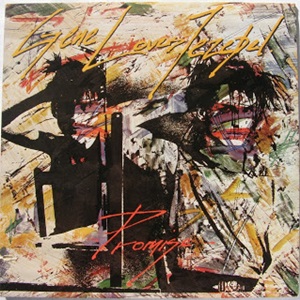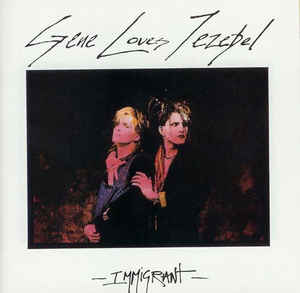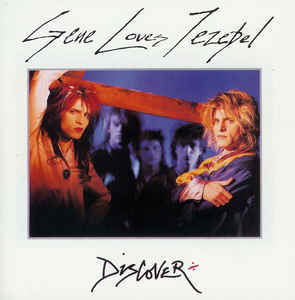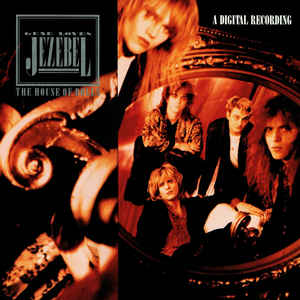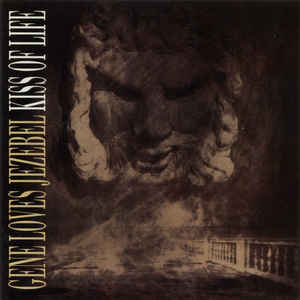Always A Flame: A Retrospective of Gene Loves Jezebel
Click on the streaming service of your choice below to listen to the playlist as you read along.
Gene Loves Jezebel’s story is an intriguing one. It’s of a band that could write great songs but whose style couldn’t find a viable place in the modern rock universe; and it’s of siblings – twins, no less – that spun their blood relationship into a creative one, only to see both split apart into an unreconciled mess. Formed in London the band was a consummate post-punk act that didn’t go the electronic route but journeyed from a proto-Goth, alt-pop sound before developing into an ‘80s version of a Glam-rock act. Their sound was dominated by the distinctive vocals of the Aston brothers, who founded the band. They never charted well but compiled a group of singles and albums in the 1980s that developed a solid following and the awareness of even the most casual fans of ‘80s new wave and indie music. And despite carrying on as separate acts, the magic they created together has never been rekindled.
The Aston brothers
The band came together around the twin brothers, Jay and Michael Aston. Their early sound was the darker pop similar to the likes of Siouxsie and the Banshees, The Cure, The Cult, Cocteau Twins, and Theatre of Hate. It was guitar-driven, with echoey vocals and heavy bass-infused rhythms. After some promising attention around their early indie singles, their first album, Promise, seemed to be setting them on their way after a #8 spot on the UK Indie chart. The second album was also strong and developed their sound, moving to a larger, more expansive structure. They came to my attention when the great song, “Always A Flame,” was on a Vertigo Sampler album I had.
After a move to their label’s parent, Beggar’s Banquet, and a deal with Geffen in the US, the major label support helped them issue two of the best albums of the latter half of the 1980s. That period was a weak one for modern rock, and Gene Loves Jezebel was one of the bright lights, helping bridge modern rock from the lighter, synth-driven period of new wave into the guitar-laden era of grunge. Discover and House of Dolls are filled with catchy, dark pop melodies with outsized choruses, all built on solid R&B structures. Moderate chart success came with their singles reaching the top 100 in the UK charts, and “Motion of Love” reaching #88 in the US. I recall “Desire” being a prominent song of the time, but its chart success – or lack thereof – suggests it was less the breakthrough for them than I thought.
From Goth to Glam
It was during the recording sessions for The House of Dolls that things started to break down between the brothers. They accused each other of being hard to work with. Michael complained that Jay was taking the band in too commercial a direction in sound and image as well as taking more lead vocal duties, which Jay countered that having to include Michael in the vocals led to the very pop harmonies that Michael was criticizing. The difficulties culminated in Michael leaving the band in 1987 to pursue a solo career.
The differences in opinion between the brothers encapsulated the challenge Gene Loves Jezebel was having with its career. Unloved by core Goth and alternative audiences as being too pop sounding and too close in style to the hair-metal bands of the time, yet with a sound that was too different for mass audiences and not rock enough for the heavy metal crowd, they rode in a space that limited their overall fan base despite the quality of the music. “The Motion of Love” was just the first song to crack the US charts at #87.
Jay Aston continued with the band, releasing an album in 1990, Kiss of Life, which proved to be another solid album filled with many quality songs consistent with the band’s sound. “Tangled Up in You” and “Kiss of Life” were among the best songs they’d recorded. It would be their last shot at gaining larger success given their sound was falling out of favour as the dominant music styles moved away from the stylized pop of the band. To some degree greater success seemed to be at hand when “Jealous” achieved a peak of #68 on the US chart and a #1 spot on the US Alt-Rock chart, but when their next album, Heavenly Bodies, came out in 1993 they were unable to achieve much success with it. Their label was also shutting down, leaving the band with an uncertain future.
Jay Aston
In the mid-‘90s the brothers reunited and began recording new music with a new band and playing some shows in 1997. This led to the 1999 album VII, but by the time of its release the Astons had parted ways again and there was little evidence that Michael had participated in the album. Things also got messy when Michael decided to resume his career, but not as a solo artist but with a band to also be called Gene Loves Jezebel. Jay and the original members of the band sued him to stop this, but after a while dropped the suit. Michael and his new version of Gene Loves Jezebel also released an album in 1999, Love Lies Bleeding. Since then the two bands have operated with Michael’s version in the US and Jay’s in the UK. Michael released albums in 2001 and 2003 while Jay hasn’t released new music until 2017. Both have issued live albums, demos, and re-recorded releases in the interim.
Michael Aston
Gene Loves Jezebel was one of the better acts of the later ‘80s in the modern rock genre. They were not hugely influential and loved and loathed in equal measure. But anyone that enjoys a good melody, guitar-driven modern rock with edgy vocals and solid rhythms can’t go wrong diving into any of the band’s first five albums. Even the later albums have several great tracks if not a little too familiar to the ear. The Aston brothers’ vocals are the defining aspect of Gene Loves Jezebel’s sound, and if it’s not pleasing to you then this band will be a hard sell, but I’ve always liked the distinctiveness and character of their voices, harmonized or not, and have easily warmed up to their sound. I encourage you to check them out if they have been overlooked.
The Playlist - (song \ album (year)
Screaming (for Emmalene) (single version) \ Promise (1983)
Always A Flame \ Immigrant (1985)
Over the Rooftops \ Discover (1986)
Desire \ Discover (1986)
Beyond Doubt \ Discover (1986)
Sweetest Thing \ Discover (1986)
Gorgeous \ The House of Dolls (1987)
The Motion of Love \ The House of Dolls (1987)
Suspicion \ The House of Dolls (1987)
Jealous \ Kiss of Life (1993) - without Michael
Kiss of Life \ Kiss of Life (1993)
Walk Away \ Kiss of Life (1993)
Tangled Up in You \ Kiss of Life (1993)
Break the Chain \ Heavenly Bodies (1993) - without Michael
Who Wants to Go to Heaven \ VII (1999) - Jay version of GLJ
Know I Love You \ VII (1999)
Loving You is The Best Revenge \ Love Lies Bleeding (1999) - Michael version of GLJ
Downhill Both Ways \ Exploding Girls (2003) - Michael version of GLJ
Summertime \ Dance Underwater (2017) - Jay version of GLJ
World Gone Crazy\ Dance Underwater (2017)










